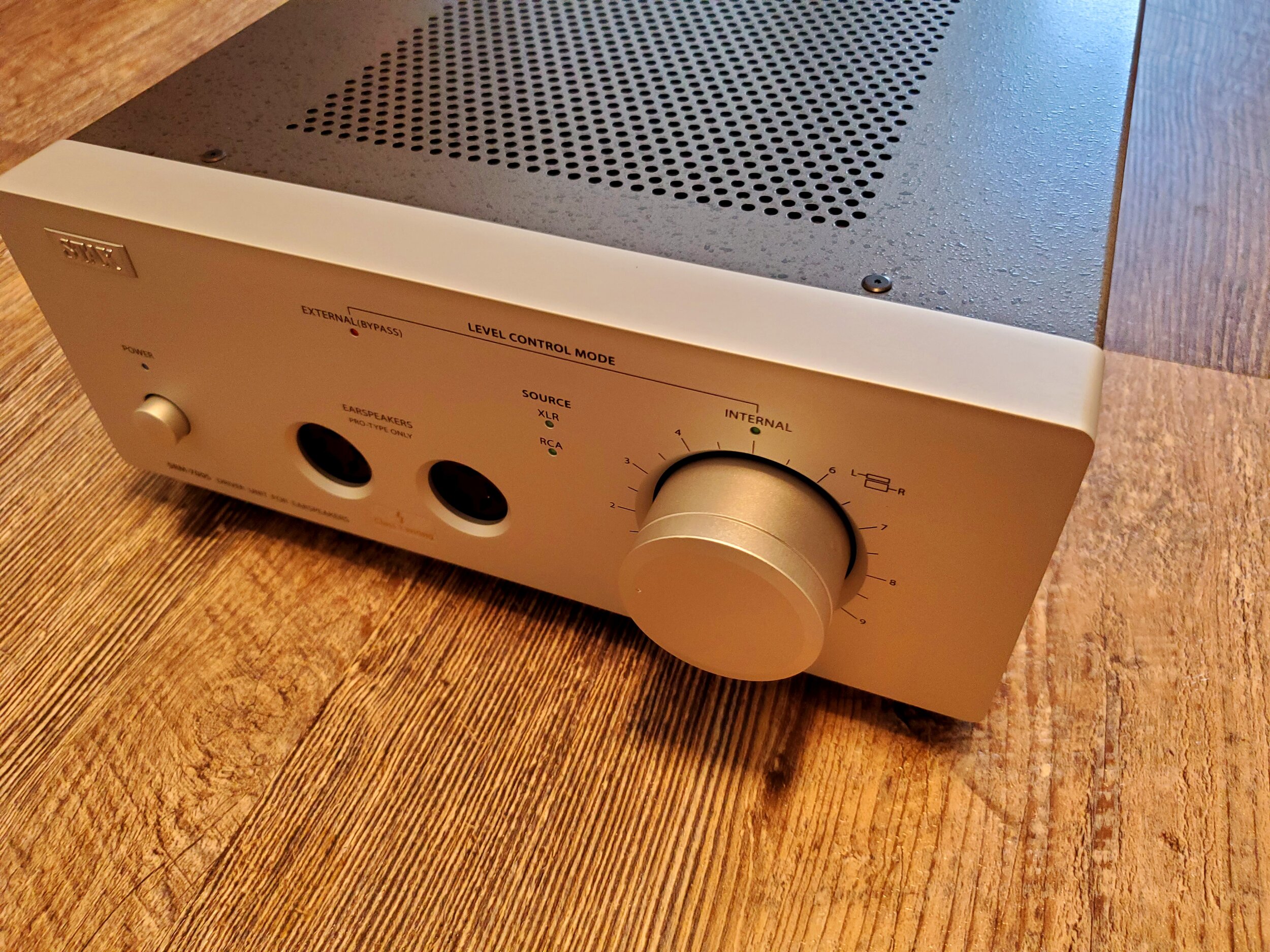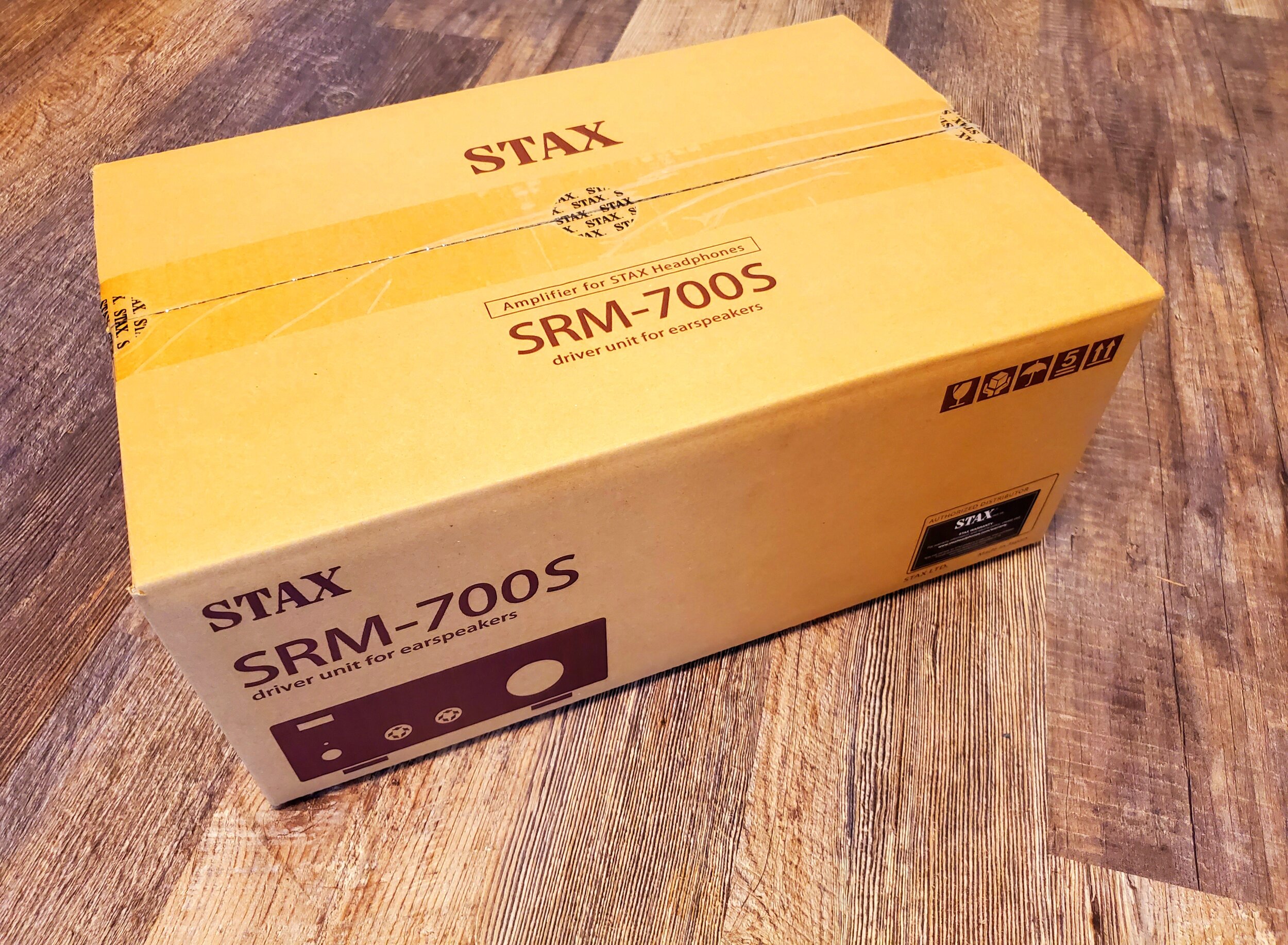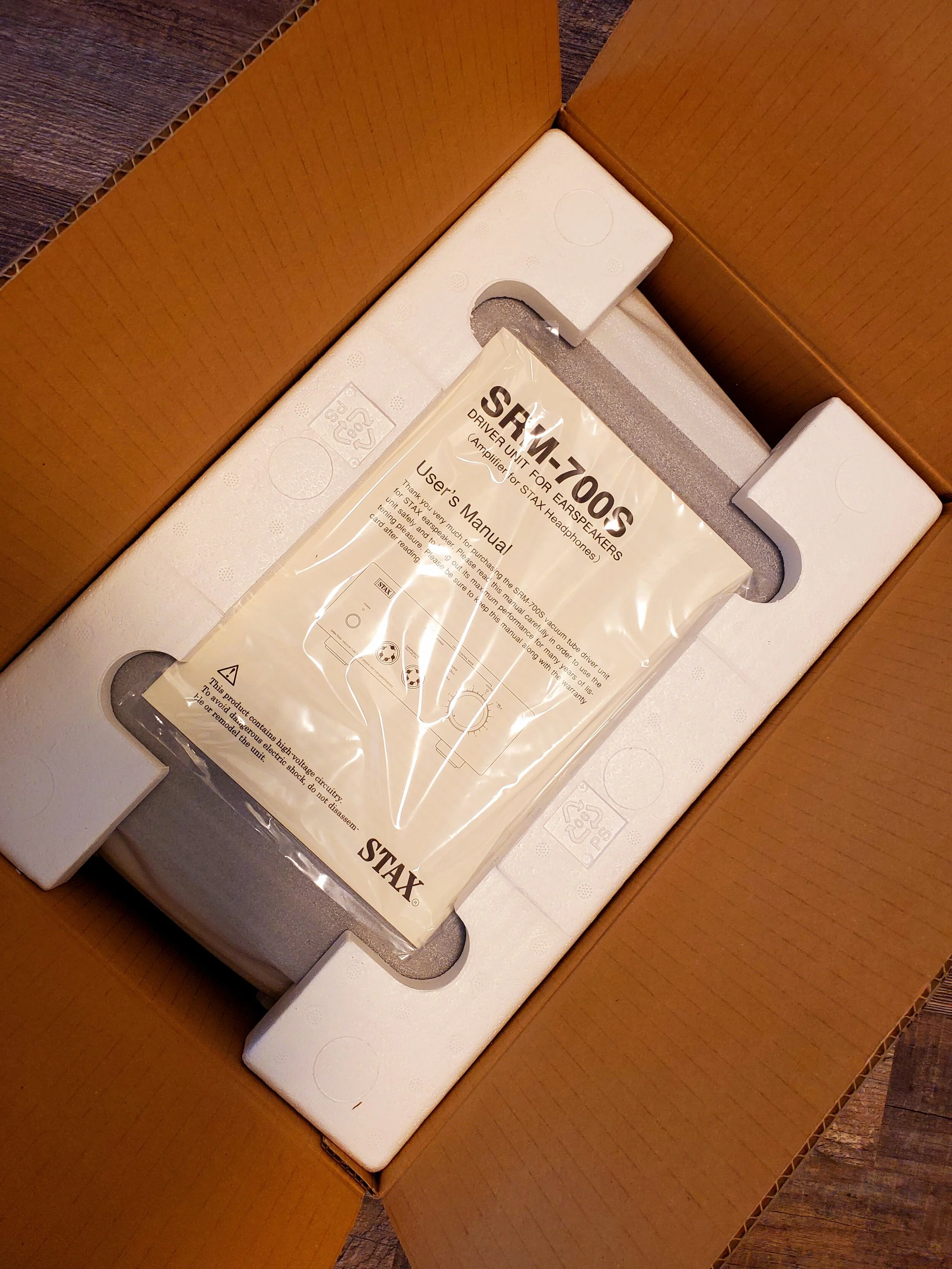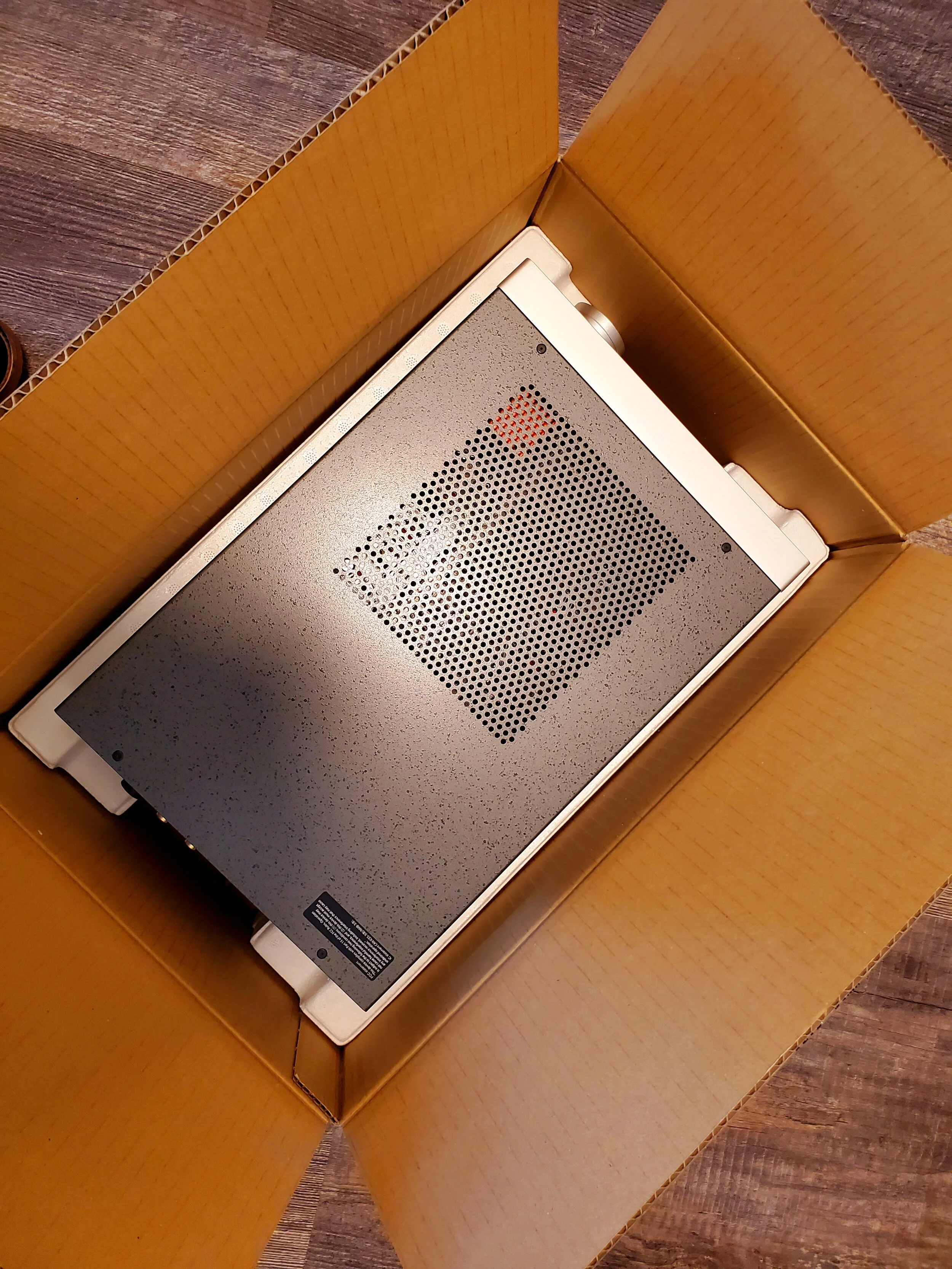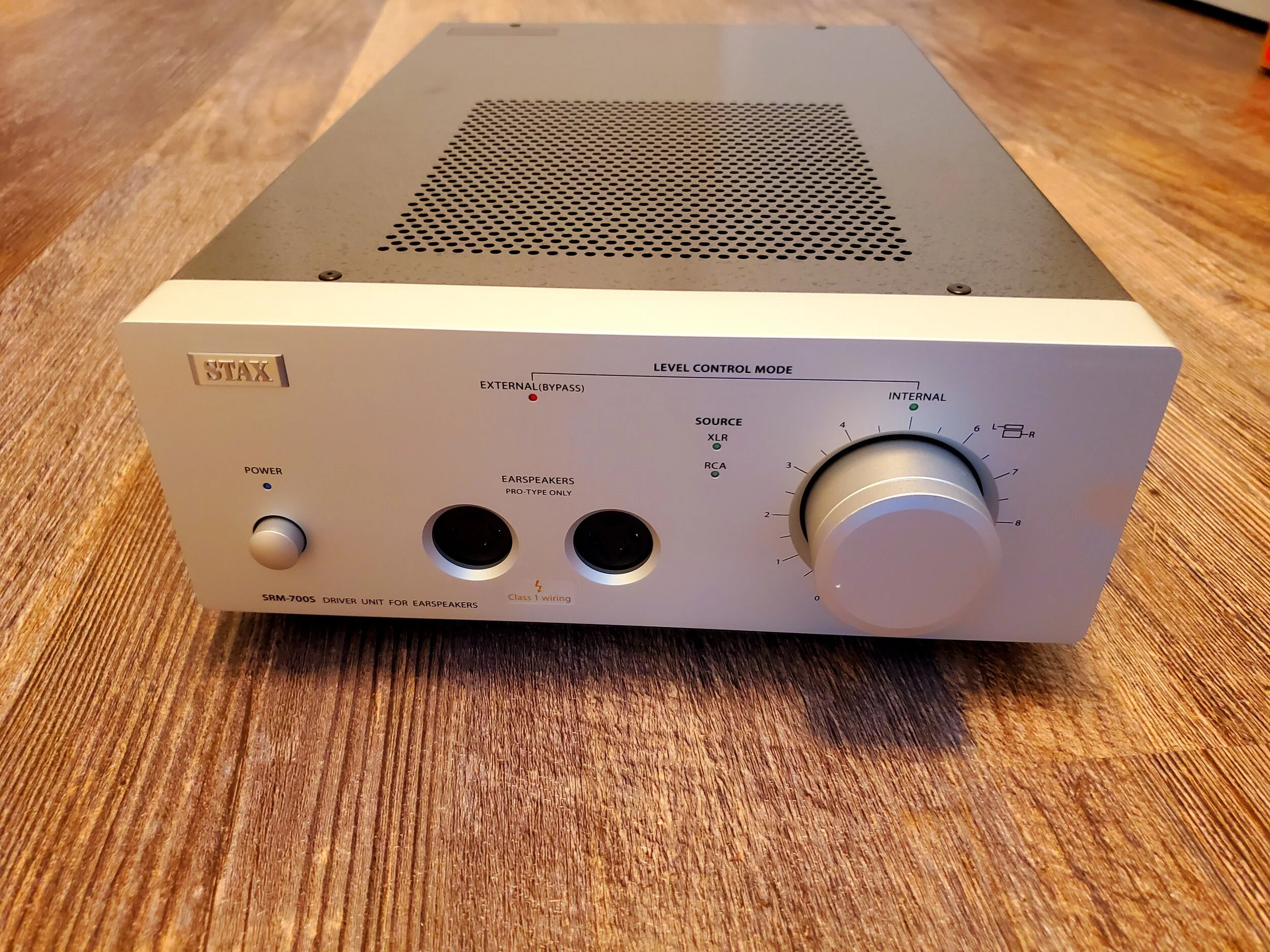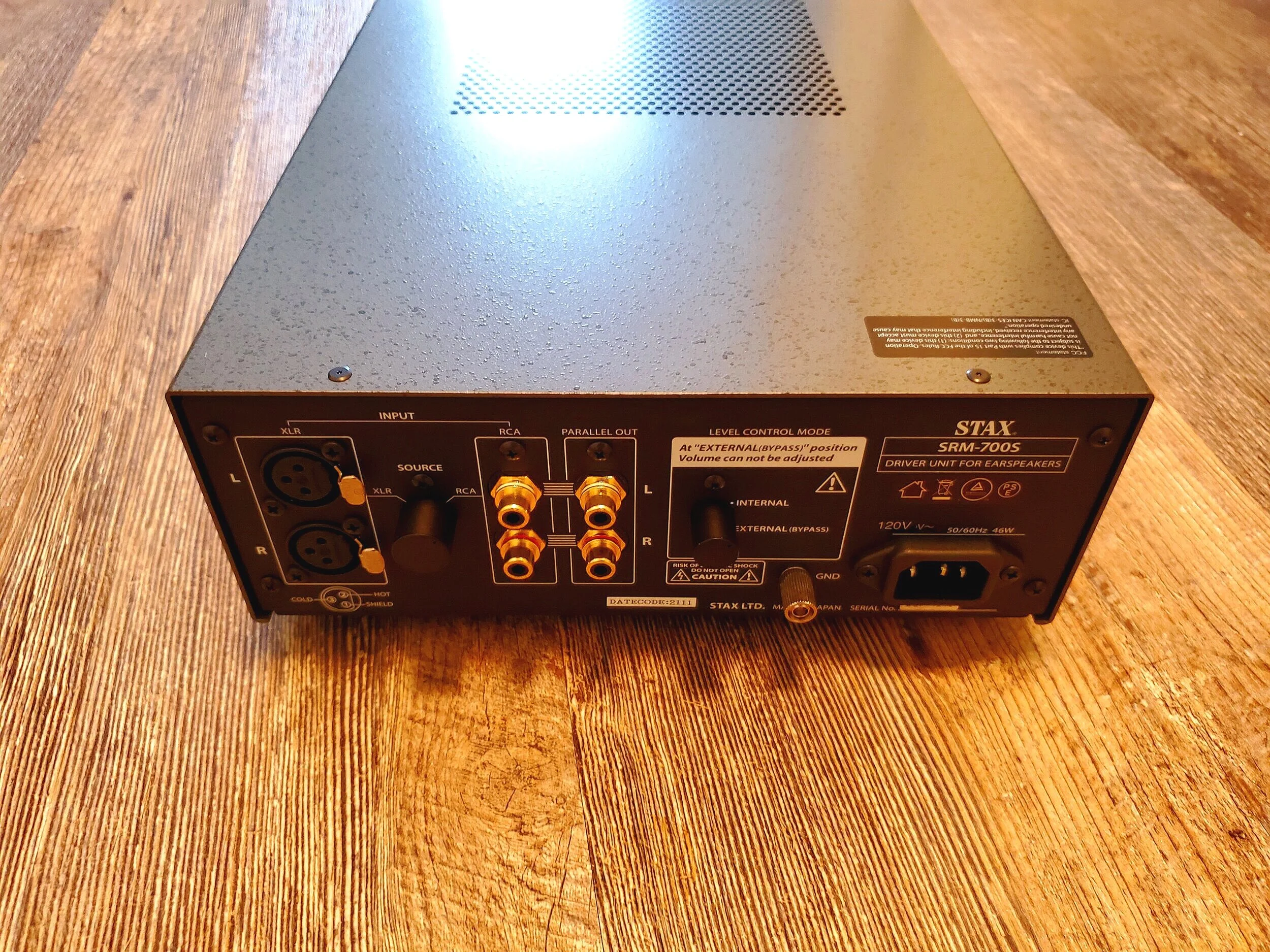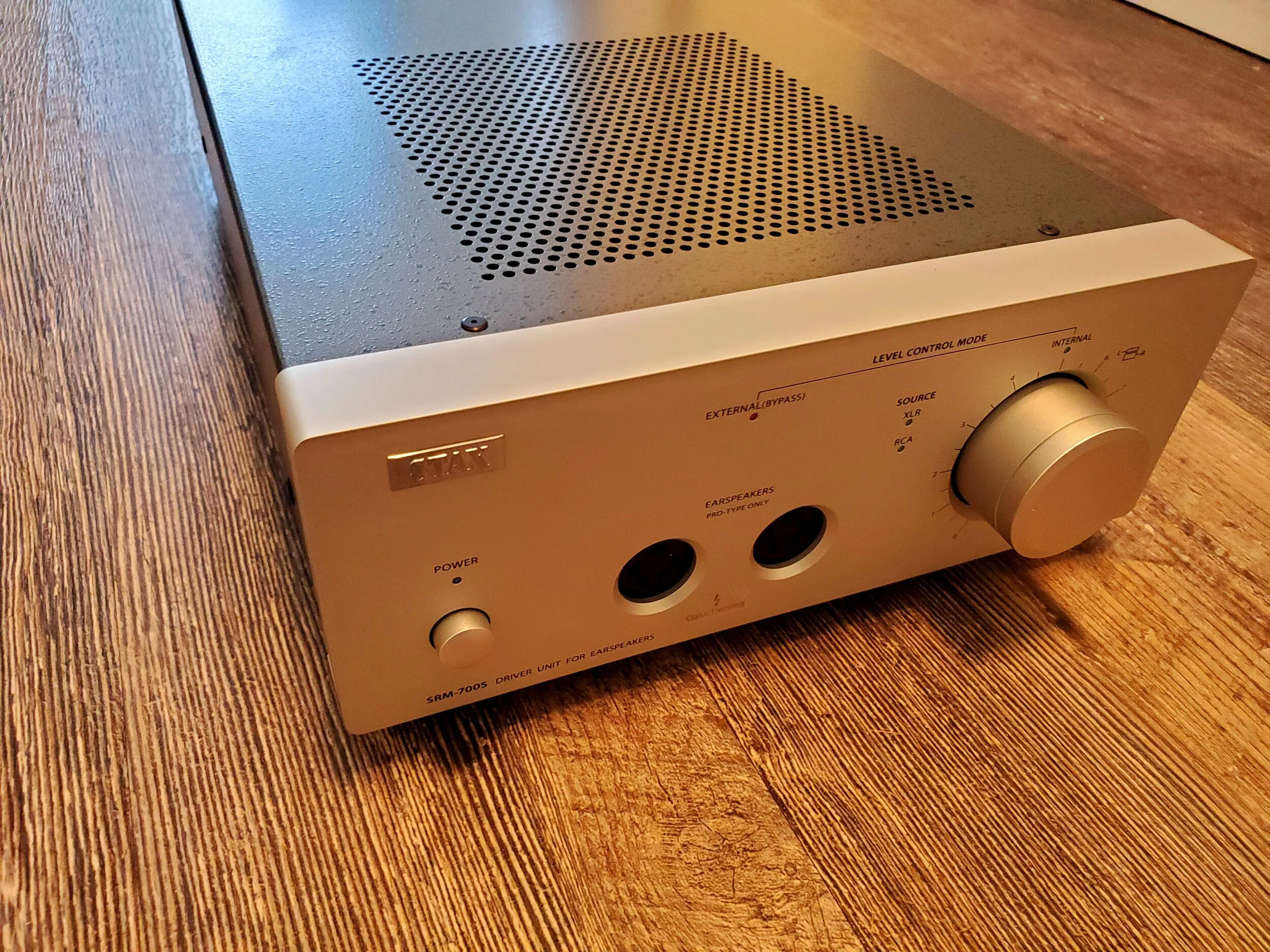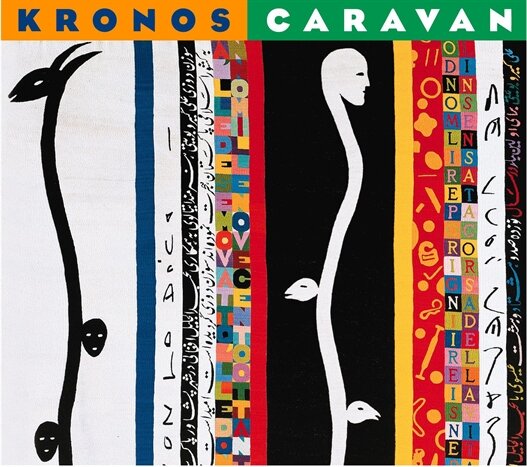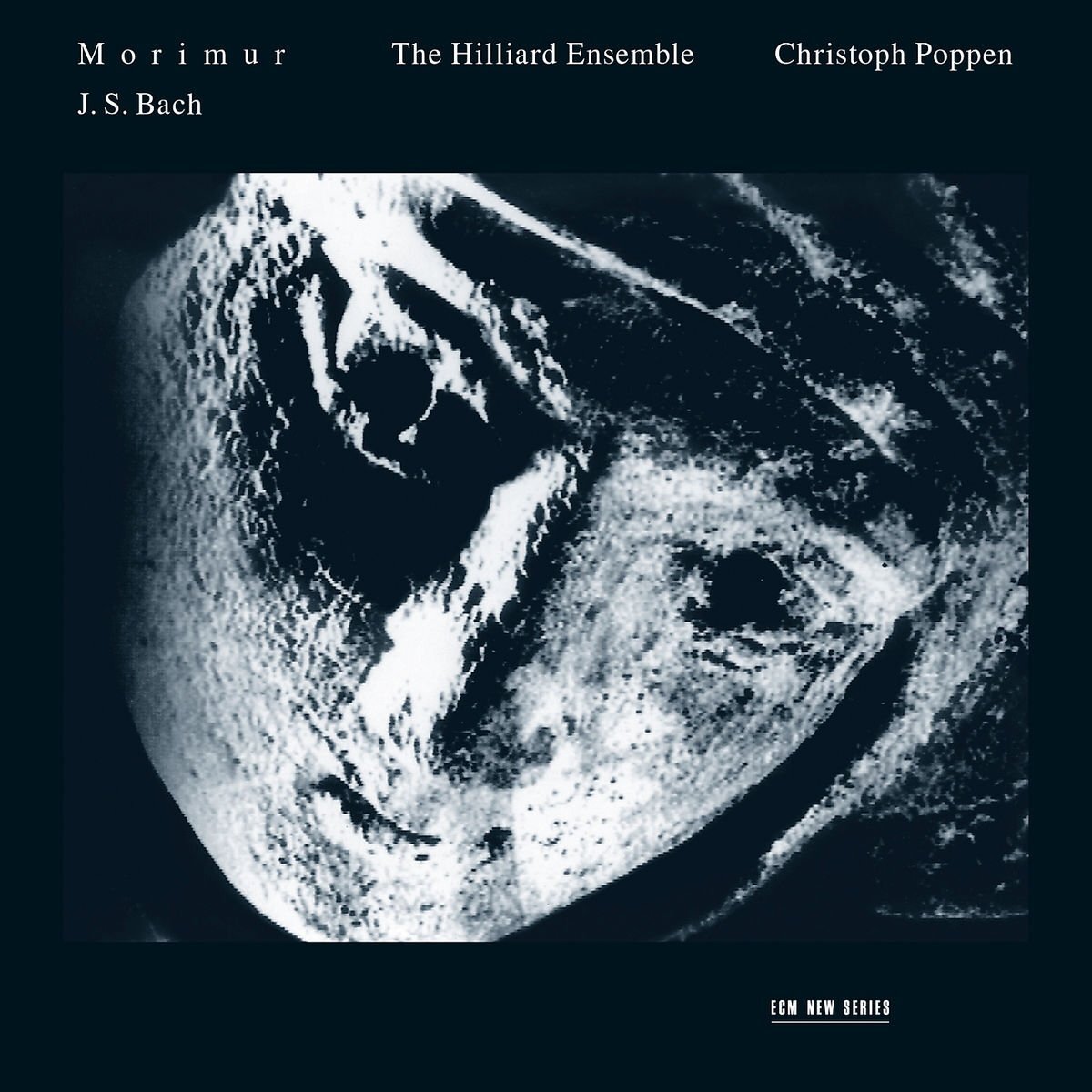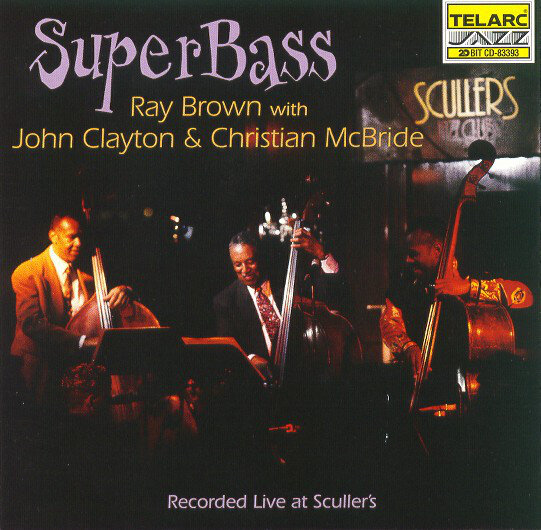STAX SRM-700S - REVIEW
An Outstanding SOLID STATE Electrostatic Headphone Energizer!
That I am gobsmacked by the STAX line of electrostatic earspeakers—SR-009S, SR-007A, SR-L700Mk2—and its electrostatic energizer (amplifiers) SRM-700T—is now as plain as unflavored, Greek yogurt! What has become incredibly evident is that STAX’s nearly 100 years in business has had a profound and continuing effect on the quality, capability, and musicality of its various offerings.
I say this after having listened to and reviewed its current Top-Of-The-Line (TOTL) earspeakers (headphones). But research has revealed that this has, apparently, always been the case, across the entire STAX line. No doubt a major reason why STAX is known the world over for its unparalleled electrostatic earspeaker and energizer (amplifier) designs and the way that they render the music.
As I wrote in an earlier review of the STAX SR-009S:
“They [STAX earspeakers] have provided a series of musical epiphanies that have not been subtle or, at all, forgettable.”
For a history of the STAX company, which I will not repeat again (for those who have read all the other reviews) please go to any of the previous reviews—SR-009S, SR-007A, SR-L700MkII—for an informative, historical perspective.
I received the STAX SRM-700S, the “S” indicating solid state, from Audio46 at the direction of STAX and I am thankful for their speed of delivery! The package was sealed, however, I did not know if this was just exacting precision on the part of Audio46 in repacking or if the SRM-700S was, in fact, brand new. I contacted Audio46 and soon discover that it was, indeed, a brand new unit.
My curiosity was quite strong to hear how the STAX SRM-700S would sound prior to burn-in. Within minutes it was placed in the second system—SR-L700MkII and Border Patrol SE-i, turned on, and allowed to cook for a few hours.
When I queued up music via Roon, placed the STAX SR-L700MkII over ears, and pressed the “Play” icon, music came forth. “Hmmm…,” I remember thinking, “this does not, at all, sound very good.” I then heeded the instructions of the good people at Audio46 and let the SRM-700S burn-in for about 70 hours before I would listen again.
A few days later I listed again. “Yeah, that’s it.” The STAX SRM-700S was singing and, in truth, I was not prepared for its detailed, transparent, and very musical voice, this was solid state after all. But over the years, I have had a few good experiences with solid state gear that did not relegate musicality to the back seat in favor of incisive, interrogation-lighting transparency. Yep, STAX was doing it again! However, at about 150 to 200 hours is where/when things truly opened up for the STAX SRM-700S!
REFRAIN: Unlike most reviews, this review will be non-sequential, as it will start, below, with how the equipment actually sounds and not the process of physically “undressing” it and/or laying out its various parts, specifications, etc. Think of this review then, as a non-linear movie—Memento, Kill Bill, Arrival, Eternal Sunshine of the Spotless Mind, The Terminator, In the Shadow of the Moon, The Queen’s Gambit, etc—that, likewise, starts at the end and winds its way to the beginning.
The Sound
The STAX SRM-700S’ main squeeze is electrostatic headphones and only electrostatic headphones. Like its electrostatic energizer twin (SRM-700T) it is exceptionally transparent and spacious, extended and beautifully engaging. Not so long ago, I believed this combination of traits a chimera—an illusion, a dream, an unbalanced equation. I know now that it is not an illusion, given the proper componentry and the appropriate world, which in this case is electrostatics.
A slight review detour, as some may find the upstream componentry a bit out of whack for a four-figure earspeaker and energizer. The detour—why is a $30k (Audionet DNP & EPX) or a $13.5k (Mola Mola Tambaqui) front end not at odds with the STAX SRM-700S ($3400) or the STAX SR-009S ($4545)? Simply put, the STAX SR-009S is at the top of the electrostatic earspeaker (headphone) mountain, the apex of electrostatic earspeaker technology. And the STAX SRM-700S is near the top of the mountain, just below it elder sibling the SRM-T8000 (review coming soon). The SR-009S, however, is like the six-figure, Top-of-the-Line (TOTL) loudspeaker, that brings to its listeners what the SR-009S brings to its. Though I can say, from personal experience, there are few apex, non-electrostatic loudspeakers that can deliver everything the STAX SR-009S does (see STAX SR-009S review). Further, with electrostatic earspeakers there is no listening room, no listening room feedback issues, no positioning issues, no need for room correction, nor for a spousal/partner blessing of speaker size/volume/placement. You’re plugged directly to the music, where your ear-veins take in the signal! In this way, despite the cost differential we are talking apex technological prowess, which quite logically and beautifully joins the the STAX SR-009S ($4545) to the Mola Mola Tambaqui ($13500) and the Audionet DNP/EPX combo ($30,000) as they are all TOTL and thus eminently compatible.
Case in point. I recently visited a friend whose high-end, two-channel, system is top-flight and impressive! I was granted the room’s listening sweet spot, to experience this stereo system, and was thankful to have had it. As the music began, remote in hand, I was also given volume honors, I turned the volume up. I turned it up again and would have done so a third time had I not noticed my friend’s concerned look. I would discover from him later that this was the loudest he had ever played his system. For the record, I’ve never been an eardrum-detonating audiophile, I had just been listening, for months now, to electrostatic earspeakers and energizers. And I was, simply, not getting the transparency, the detail, the wealth of information, nor the whole-cloth coherency, that I had been getting with my TOTL electrostatic setups. I mentioned this to my friend and, I believe, he got it. Shortly thereafter, he began his search for earphones as an addition to his stereo system. I’ll be setting up an electrostatic listening session for him, with the normal warning. Beware, as you may never go back to the non-electrostatic world!
Okay, back on track now with the “Sound” of the STAX SRM-700S. If you can remember Nelson Pass’ Aleph 5, then you’re getting close to the sound of the SRM-700S electrostatic energizer. And, truly, auditory memory is short and it has been decades since the Aleph 5, but it made a very powerful impression on me. However, I would say that the holography of the SRM-700S, its speed, transparency, its of-a-whole-cloth integrity, and musicality, as mated to an electrostatic earspeaker, are not matched. I have also owned a Pass Labs system composed of the two-box preamplifierXVR-1(?)—two of its TOTL amplifiers—XA 200.5—and they were quite magical, though very expensive. The Pass Labs mono-block amps were also able to warm up a closed room by 15 to 20 degrees, in a flash! PG&E loved me. A beautiful Transrotor Fat Bob S helmed the analog and it was glorious. And an Audio Aero Capitole helmed the digital. I’d love to have that Fat Bob S now! The point, however, is that the electrostatics—STAX SRM-700S and SR-009S—for a fraction of the cost and none of the heat (and attendant electricity bills) bring a glorious musicality, transparency, whole-cloth coherency, and transient speed that are difficult to rival. There are, perhaps, few TOTL, two-channel systems that would be able to match the STAX TOTL electrostatics. And I’ve yet to review the STAX SRM-T8000 (wasn’t that the Terminator’s designation?).
The STAX SRM-700S like the LTA Z10e is incredibly transparent and musical and, yet, the SRM-700S is more propulsive, potent, travels more deeply into the sub-bass regions, and is a bit more incisive. The Z10e and the STAX-SRM-700T, on the other hand, bring a richness, three-dimensionality, and a sunlit transparency, that is truly addictive. This is not to say that the SRM-700S does not bring richness, three-dimensionality, as well, it does, just to wee lesser degree. As a lover of tubed gear, I can tell you that the STAX SRM-700S is very musical and very engaging, and should you partner it to say, the Border Patrol SE-i DAC, with its sweet, detailed, dusk-lit glow musicality, then transparent, transient quick, musical bliss awaits. It’s all about the synergy.
The STAX SRM-700S’s volumetric cube—its soundstage—is vast—deep and wide with great height. The SRM-700S is, as mentioned above, incredibly transparent, provides for rock solid positioning and layering, which will allow one to quickly realize just how much information has been missing, across CDs, downloads, streaming libraries, etc. Coupled with any of the STAX earspeakers or the Dan Clark VOCE, there will be, as I wrote in a previous review of STAX equipment, “sublime revelation after sublime revelation.”
For its evaluation across the segmented frequency spectrum the STAX SRM-700S was paired to the STAX SR-009S ($4545), STAX SR-L700MkII ($1649) and the Dan Clark VOCE ($3,299) electrostatic headphones. The Mola Mola Tambaqui and the Audionet DNP/EPX DACs both aligned to a ROON Nucleus Plus fronted the system. Cables were Cardas Clear and ANTICABLE’s TOTL (review coming soon), and power was courtesy TORUS.
Bass
Allied to the various components above, the STAX SRM-700S was able to tease out every last measure of bass. And as Eiji Oue’s V. Infernal Dance of King Kashchey (Stravinsky, Reference Recording) now queues and powers its rendering is commanding, potent, and explosive. The combo travels, at speed, to sub-bass depths, where together they capture, easily, the Holy-Bass-Head-Grail. The rapid mallets strikes across the seven assembled tympani are all clearly captured, resolved, and foreboding, as they issue in the monstrous strikes to follow. And yet, the delicacy of triangles and cymbals are undiminished and pristine. The crush of bass notes has not disturbed them in the least and then quiet. In a flash (gapless playback) Christian McBride’s Fat Bach and Greens (Conversation with Christian, Mack Avenue Records) queues and the interplay of classical and jazz, bass and violin is dynamic, tight, rollicking, and crazily transparent! It’s a joyride of two talented musicians, as mentioned in an earlier review who are, “both driving the same car simultaneously(!) and, at times, it’s on only two wheels!” Thereafter, every bass test track—Marcus Miller’s Power, Ray Brown, et al.’s Centerpiece, Mezzanine’s Angel, etc.—thrown at the SRM-700S is rendered in its full bass-crushing and/or bass-transparent glory. And did I mention the head-bopping, top-tapping, rhythmic drive and PRaT—Pacing Rhythm and Timing—of the SRM-700S? It’s all there. You go STAX SRM-700S!
Midrange
One of the first things you notice as Olafur Arnalds’ Árbakkinn (Island Songs, Mercury (Universal France)) plays is the profound silence between word and note and the chirping birds. Then there is the tightness of structure, the wholesale excavation of detail and nuance, the light speed transients, and the natural, engaging musicality. Unexpected? Yes, from a solid state component and yet so beautifully rendered. Joan Shelly’s Wild Indifference (Joan Shelly, No Quarter) queues up with Joan counting down. Then a guitar enters stage right and another stage left, both firmly fixed in space. Joan’s voice follows, her words beautifully articulated, her voice natural, laden with warmth, emotion, which compel a repeat. It is a different portrayal via the STAX SRM-700S, than its tubed electrostatic sibling, though it is no less beautiful and, yet, is a wee bit more tightly woven. Regardless of the midrange music—Katie Melua, Kandace Springs, Voces8, etc.—that I queued up for play, the SRM-700S delivered a weighty, natural, transparent, and transient-quick rendering. I’d be remiss if I did not mentioned the ‘air’ which the SRM-700S brought, that gave definition and volume, to venues across the various tracks, which, in general, is a, decidedly, tubed trait. I had expected less of the SRM-700S in this frequency segment, yet received a good deal more, as its partnership to the SR-009S, and the Mola Mola Tambaqui and the Border Patrol SE-i proved exceptional!
Treble+
Emmanuel Bertrand's Tout un Monde (Dutilleux & Debussy: Works w/Cello, Harmonia Mundi) rises mysteriously, somberly, and then a gong sounds and fades naturally, then silence. The transparent, transient quick capture of every cello pluck, cymbal hit, and brush over tympani is superb. The stage via the SRM-700S and company is completely see through to its depths and its sides and the dynamic shifts within are easily ridden and easily rendered. It is, again, a different hearing than that offered by its tubed electrostatic sibling and it is very compelling in its own way. Hmmm…am I becoming a solid state guy all over again? The Kronos Quartet’s Aaj Ki Raat—Tonight is the Night—(Kronos Caravan, Nonsuch) queues and despite the profusion of exotic instruments—Hindustani tabla, Lebanese nay, Iranian kemancheh, etc.—and the not so exotic—violins, viola, and cello—air and space circle and place them all, distinctly, across a vast soundstage. It is a detail rich rendering complete with a naturalness of tone/timbre, speed, and incredible treble extension that is breathtaking. Count me very impressed.
The Wrappings and Accessories
The STAX SRM-700S comes in a simple brown, cardboard box, with each of its sides printed with the energizer’s designation. Inside foam insulation holds secure and provides protection for the electrostatic headphone amplifier.
The included contents are the STAX SRM-700S, a stock power cord, stock interconnects, an instruction manual, and a warranty card. You’ll want to lose the stock cord and interconnects and get very good aftermarket cords.
Design—Look and Feel
The STAX SRM-700S, like its near twin—STAX SRM-700T—sports the same traditional design—clean, purposeful, minimalist—only that which is needed—with an anodized, aluminum facade, a gray-coated, steel body and five LEDs across its aluminum facade. The SRM-700S’s top features a rectangular cooling vent (gone are the two, small, vented, convex mounds directly above the two 6SN7). The SRM-700S measures 240W x 103H x 393D mm, exactly like its near twin the SRM-700T.
The SRM-700S is very well executed and built to last, which so very many STAX energizers appear to do, they last. Simple, straightforward, and clean is fully embodied by the design of this electrostatic energizer (headphone amplifier).
Functionality
The STAX SRM-700S is a solid state (FET and JFET)—electrostatic headphone amplifier, which means that the SRM-700S can only be utilized with electrostatic headphones.
The SRM-700S is clean and very straight forward, as it simply amplifies the signal which it receives from a source—DAC, CD player, phono-pre, etc. Its front panel from left to right features an on/off button which when “on” is blue. Beside the on/off button are dual, 5-pin, electrostatic headphone outputs. And on the far right is a large volume knob, that can be split to adjust for balance in the left and right channel. Just hold one segment of the volume knob while turning the other. Oh, and between the headphone outputs and the volume knob are two indicator lights which alert you to whether you’re connected via balanced (XLR) or single-ended (SPDIF) inputs.
Its back panel features two inputs—a balanced set (XLR) and a single-ended set (RCA). It also incorporates a Parallel Out which allows you to connect it to another system. There is a selector switch on the back, a grounding post, and an IEC socket (power plug).
The STAX SRM-700S will drive any electrostatic headphone with a 5-plug connector, which is pretty straight forward and which means impedance, sensitivity, are not issues.
The Specifications
STAX SRM-700S
Type: All-stage FET configuration DC amplification driver unit
Frequency response: DC - 100kHz (with one SR-009S)
Gain: 60dB
Harmonic distortion: 0.01% or less (1kHz/100Vrms output)
Input impedance: 50kΩ (RCA), 50kΩx 2 (XLR)
Maximum output voltage: 450Vrms (1kHz)
Bias voltage: PRO 580V
Operating temperature/humidity: 0 to 35 degrees C/less than 90% (non condensing)
Input terminal: RCA x 1, XLR x 1
Output: RCA parallel output terminal
Power consumption: 46W
Dimension: 240W x 103H x 393D mm (maximum protruding portion included) Weight: 6.3kg
Conclusion
Yeah, I’ll take them both—STAX SRM-700T and SRM-700S—to cover all possible angles of music playback, from the tip-top treble regions, on their way to Jupiter or Alpha Centauri, to the sub-bass depths of the Holy-Bass-Head-Grail, to that transparent, preternaturally engaging midrange. If only…
Count me twice surprised now by a tubed electrostatic headphone amplifier—STAX SRM-700T—sporting 6SN7 tubes in the power role and now by a solid state electrostatic headphone amplifier—and now the STAX SRM-700S—that stands at the doorway of two worlds—tube and solid state—though it is bereft of a single tube but can, nonetheless, speak both world’s languages rather fluently. The STAX SRM-700S is an extremely capable earspeaker energizer that, simply, must be heard!
I don’t know what to tell you. Apparently, STAX’s nearly 100 years in business has taught it a thing or two about electrostatic audio componentry and earspeakers. And that STAX continues to improve its electrostatic componentry via continuous R&D has found each of its components, at least those reviewed to date, at the top of their respective component categories and the top of their respective price segments (and far beyond in many cases).
We, AudioKey Reviews, highly recommend the STAX SRM-700S and award it our GOLDEN KEYNOTE AWARD. As I mentioned in an earlier STAX review, “We did not know it at the time, but it appears that our motto is embodied and beautifully defined by this electrostatic integrated/headphone amplifier as allied to, of course, electrostatic earspeakers/headphones.” And so it is.
Pros: Electrostatic transparency, weight and sub-bass potency, transient speed, incredible soundstage and imaging, musicality, etc.
Cons: None.
The Systems
1.
Roon Nucleus+
Mola Mola Tambaqui
Dan Clark VOCE
STAX SR-009S
STAX SR-007A
STAX SR-L700MkII
ANTI-CABLE/CARDAS cabling and wires
TORUS TOT MAX
2.
Roon Nucleus+
Audionet DNP/EPX
Dan Clark VOCE
STAX SR-009S
STAX SR-007A
STAX SR-L700MkII
ANTI-CABLE/CARDAS cabling and wires
TORUS TOT MAX
3.
Roon Nucleus+
Border Patrol SE-i DAC
Dan Clark VOCE
STAX SR-009S
STAX SR-007A
STAX SR-L700MkII
ANTI-CABLE/CARDAS cabling and wires
TORUS TOT MAX
THE MUSIC
The Company
STAX
STAX SRM-700S $3400
STAX
#2101 The L Plaza
367-375 Queen’s Road Central
Hong Kong
+852 2522 6989
cs@staxheadphones.com
